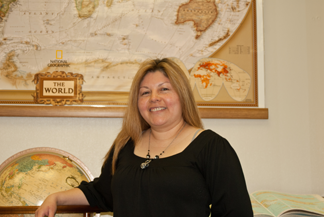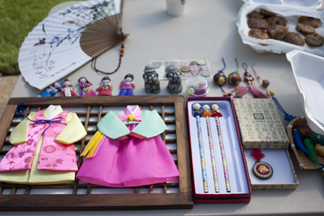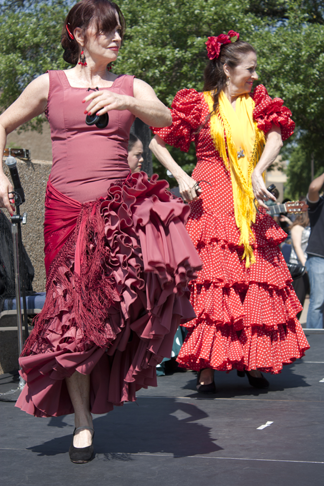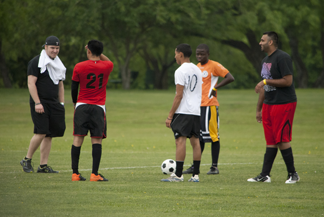By Elaine Bonilla/south news editor
One South Campus student struggled to overcome the odds but never gave up when it came to getting an education in the United States.
At age 6, Maricela Pineda’s parents divorced, and she lived with her father in Mexico until he left in search of work in the U.S. She then went to live with her mother. Times got hard, and the family lost everything. To get a better life for her children, Pineda’s mother left her two daughters with their grandmother while she moved to continue her education. At that time, Pineda took over the role of being a mother to help raise her sister, who was less than a year old. Her mother eventually returned to take care of her children.

Jordan Hess/The Collegian
Everywhere she went, Pineda looked for her father. The few times he would visit, he came in search of Pineda, but her mother didn’t want them to have contact with each other. Her mother would hide her in various places, such as a closet, where she remembers hearing her parents arguing.
Her mother later remarried and had a baby boy. To raise a family, Pineda’s mother worked three jobs, one as schoolteacher. Her stepfather was around more, and Pineda said he began abusing her and her younger sister.
Pineda’s father visited once when she was 12 and again when she was 15. She was excited to see her father, who walked with her to school.
“I remember him trying to carry my bag and being afraid he would see the items I was selling at school,” she said. “I was scared he would get mad at my mom for me working.”
Fresh fruit, cookies, beans and homemade Barbie clothes were just some of the items Pineda would sell as a child in Cuernavaca, Mexico, to help bring in income for her family.
Eventually, she told her father about the abuse she was enduring from her stepfather. When he heard about this, she was given the chance to get away and come to the U.S.
“My sister was holding on to my feet, begging me not to go,” she said. “I knew I had to leave, so I opened my sister’s arms and promised her I would be back for her, which was June 1990.”
Pineda moved to South Central Los Angeles not knowing any English. When she arrived, she thought her dad had taken her somewhere else. It wasn’t how it was portrayed in the movies. The neighborhood was bad with drugs everywhere, but it was still nicer than the little town in Mexico.
“A few months later, I came back and stole my sister and took her to live with me in California,” she said. “Since she was only 6, she couldn’t stay because she missed our mom too much.”
The first part of becoming a U.S. citizen is to apply for residency, so Pineda needed a family member to claim her. She asked her father several times to sign the paperwork, but he never would.
While in California, Pineda was given the chance to continue school for free, an option not available in Mexico after ninth grade. School had been important to Pineda since she was a little girl.
“In Mexico, the students with the best grades would be allowed to carry the flag around,” she said. “I always made the best grades to show my family I appreciated the opportunity to be in school.”
Her mom never got the chance to see her carry the flag, but she remembers seeing her grandmother hiding in the crowd.
She repeated the ninth grade and continued to the 11th when she fell in love and became pregnant by her boyfriend at the time. When he found out, he wanted her to have an abortion. She refused. She moved in with him for the first six months and almost lost her daughter twice. After this, she returned to her dad’s house.
“I kept going to high school with my tummy,” she said. “I promised her [the baby] that we would make a difference together and that we would make it.”
The whole time she was in the U.S., she never spoke English because she didn’t know it. She finally realized she knew English when she was in the hospital about to give birth to her daughter, and she heard the doctors say something was wrong.
“What’s wrong with my baby?” she said. “Please save my baby!”
She needed a cesarean section, which scared her because she didn’t understand what that meant.
“That was the moment I realized I knew English, when it came down to my daughter’s life,” she said.
Pineda had to take jobs that paid cash since she was an illegal immigrant. She would sell cosmetics and underwear door to door, wash dishes and clean houses. She even worked as a clown with another single mother with two children from El Salvador. They would paint each other’s faces and their babies, work parties and split the profit.
When Pineda’s daughter was 3, Pineda moved into a program called La Posada for Single Mothers in LA. She received counseling, good role models, assistance with school and three jobs. She worked as an assistant to one of the directors and as a receptionist and ran the store where residents shopped. She also was provided a place to stay and graduated from the program. Then, she was given a bigger apartment and the chance to be resident manager of three of the buildings where she lived.
“I loved my job because I was reaching out to mothers just like myself,” she said.
As apartment manager, she met her husband and applied for residency. After 21 years living illegally in the U.S., Pineda finally received the citizenship she always wanted.
Pineda’s daughter, Yosline Cabello, is currently attending TCC with her mother.
“We’re best friends, and I tell her things children usually don’t tell their parents,” Cabello said.
Cabello said she doesn’t know of a person who would think negatively of her mother.
Pineda now wants to get an education degree from Texas Wesleyan. She admires and is inspired by her mother who is the reason she decided to go into education. She takes every opportunity to help others by being a community server, activist, teacher and volunteer by her involvement in TCC’s STARS program.
“Maricela’s goal is to be a teacher, and I believe she will be an awesome teacher,” STARS academic advisor Dennis Lee said. “She goes beyond what is required and gets excited when helping out others and giving back.”
Pineda said she likes to share her story to bring hope to others.
“I think the challenges we go through in life are just to build character and to appreciate the blessings and opportunities that you’re going to get,” Pineda said. “There’s a reason to keep on trying.”

























